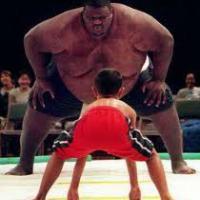 If you read my earlier post on Edmar Mednis, you know that How to Defeat a Superior Opponent is the title of the Hall of Fame Grandmaster’s 1989 book (effectively a reprint of his 1978 title How to Beat the Russians).
If you read my earlier post on Edmar Mednis, you know that How to Defeat a Superior Opponent is the title of the Hall of Fame Grandmaster’s 1989 book (effectively a reprint of his 1978 title How to Beat the Russians).
The idea of defeating a stronger player appealed to a “weakie” like me, so I devoured Superior Opponent in my early years. Unfortunately, I did not score upsets that often…
But over the years I learned a lot. Now that I have more experience, I’ll give you some of my own advice on beating players better than you.
Good psychology only goes so far.
I’m not going to insult your intelligence by telling you there is a formula to consistently beat players rated 500 points higher than you. Exception: anything goes if we’re talking about players rated under 1000.
The tips I’ll discuss can give you a slightly better chance against such opposition, but luck is your best friend here: hope the opponent underestimates you, miscalculates something, or has a bad game.
If you are a massive underdog, just play the best moves you can … for as long as you can … and don’t get too far behind on the clock. This last guideline is important: an experienced, higher-rated player will just keep the game going in your time pressure, shuffling pieces until you collapse.
For the rest of these tips, I’m going to assume you’re facing someone rated 1000+ and roughly 200 points higher than you. This is a steep hill, but not an impossible one: statistically you should score about 25% against such a player (one win and three losses in four games, or two draws and two losses).
For context, with a 300-point rating difference you’re expected to score 1 point out of 10.
Don’t change your playing style.
You have certain strengths as a chess player. Don’t abandon your strongest weapons based on who you’re paired against. If you’re an attacker, attack. If you’re a good endgame player, trade. If you know a certain opening well, play it — don’t be afraid of the opponent knowing it better than you do. Sidebar: targeting the weaknesses of a peer or an inferior opponent is often a good idea!
Believe in your ideas, and don’t try too hard.
It’s tempting to make “extra” efforts to beat stronger players, but I think the best you can do in this area is to make sure your concentration is as good as it can be for the game.
If you think you’ve found a good move or plan, and don’t see any flaws, go for it. Maybe you’re wrong and missed something, but don’t assume this is the case! That’s called “seeing ghosts.”
Calculate until the evaluation is clear.
 The most common chess evaluation symbols, for moves and positions. Image: lichess.org
The most common chess evaluation symbols, for moves and positions. Image: lichess.org
If you’re a good calculator, this is not a problem. For others, like me, calculation is not our strong suit.
Don’t go crazy trying to see everything till the end, unless mate or a decisive material balance is at stake. Otherwise, just use the Chess Informant classification that I discussed previously.
Don’t offer draws to higher-rated players.
I’m not one of those coaches who says you should always “play till bare kings!” There are a number of situations in which offering or accepting a draw makes sense, or when aiming for a more drawish position is a good idea.
However, there is almost never a good reason to offer a draw to a higher-rated player. There are two rather obvious reasons for this:
If you have the advantage, you shouldn’t be offering a draw! Doing so communicates fear and increases the confidence of your opponent, who might be on the ropes. If you’re really afraid of messing up when better against a higher-rated, you can play solidly and safely, avoiding risk. Just strike a confident pose at the board while doing so!
If you are worse — or even equal — your opponent won’t accept your draw offer. Moreover, it again shows weakness. Whether your opponent is torturing you or merely shuffling pieces back and forth, just keep finding the best moves you can while not showing any frustration. Imagine you are at a picnic on a warm summer day!
Wait for the higher-rated player to offer the draw (or, if you’re playing against a peer, the player with the superior position has the “right” to make the peace offering). Only when you’re playing against a lower-rated player can you offer a draw in an inferior position.
Experienced players: are there any other general tips I didn’t mention? Leave a comment!
